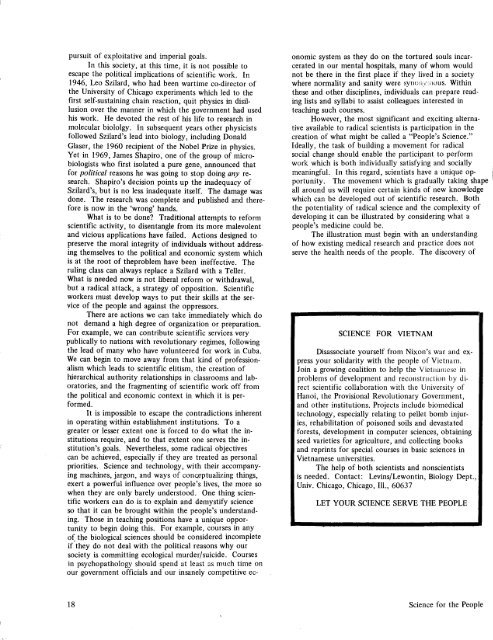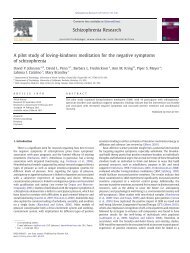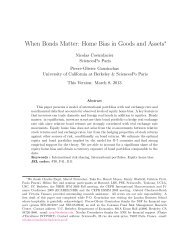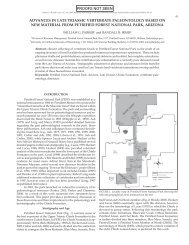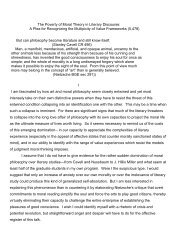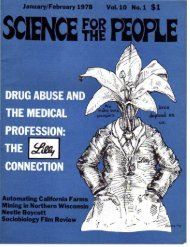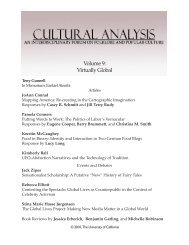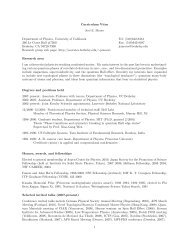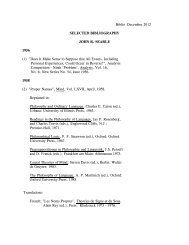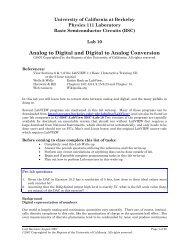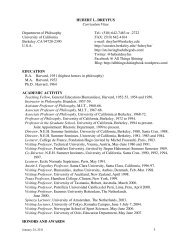Science for the People Magazine Vol. 3, No. 1 - Socrates
Science for the People Magazine Vol. 3, No. 1 - Socrates
Science for the People Magazine Vol. 3, No. 1 - Socrates
You also want an ePaper? Increase the reach of your titles
YUMPU automatically turns print PDFs into web optimized ePapers that Google loves.
pursuit of exploitative and imperial goals.<br />
In this society, at this time, it is not possible to<br />
escape <strong>the</strong> political implications of scientific work. In<br />
1946, Leo Szilard, who had been wartime co-director of<br />
<strong>the</strong> University of Chicago experiments which led to <strong>the</strong><br />
first self-sustaining chain reaction, quit physics in disillusion<br />
over <strong>the</strong> manner in which <strong>the</strong> government had used<br />
his work. He devoted <strong>the</strong> rest of his life to research in<br />
molecular biololgy. In subsequent years o<strong>the</strong>r physicists<br />
followed Szilard's lead into biology, including Donald<br />
Glaser, <strong>the</strong> 1960 recipient of <strong>the</strong> <strong>No</strong>bel Prize in physics.<br />
Yet in 1969, James Shapiro, one of <strong>the</strong> group of microbiologists<br />
who first isolated a pure gene, announced that<br />
<strong>for</strong> political reasons he was going to stop doing any research.<br />
Shapiro's decision points up <strong>the</strong> inadequacy of<br />
Szilard's, but is no less inadequate itself. The damage was<br />
done. The research was complete and published and <strong>the</strong>re<strong>for</strong>e<br />
is now in <strong>the</strong> 'wrong' hands.<br />
What is to be done? Traditional attempts to re<strong>for</strong>m<br />
scientific activity, to disentangle from its more malevolent<br />
and vicious applications have failed. Actions designed to<br />
preserve <strong>the</strong> moral integrity of individuals without addressing<br />
<strong>the</strong>mselves to <strong>the</strong> political and economic system which<br />
is at <strong>the</strong> root of <strong>the</strong>problem have been ineffective. The<br />
ruling class can always replace a Szilard with a Teller.<br />
What is needed now is not liberal re<strong>for</strong>m or withdrawal,<br />
but a radical attack, a strategy of opposition. Scientific<br />
workers must develop ways to put <strong>the</strong>ir skills at <strong>the</strong> service<br />
of <strong>the</strong> people and against <strong>the</strong> oppressors.<br />
There are actions we can take immediately which do<br />
not demand a high degree of organization or preparation.<br />
For example, we can contribute scientific services very<br />
publically to nations with revolutionary regimes, following<br />
<strong>the</strong> lead of many who have volunteered <strong>for</strong> work in Cuba.<br />
We can begin to move away from that kind of professionalism<br />
which leads to scientific elitism, <strong>the</strong> creation of<br />
hierarchical authority relationships in classrooms and laboratories,<br />
and <strong>the</strong> fragmenting of scientific work off from<br />
<strong>the</strong> political and economic context in which it is per<strong>for</strong>med.<br />
It is impossible to escape <strong>the</strong> contradictions inherent<br />
in operating within establishment institutions. To a<br />
greater or lesser extent one is <strong>for</strong>ced to do what <strong>the</strong> institutions<br />
require, and to that extent one serves <strong>the</strong> institution's<br />
goals. Never<strong>the</strong>less, some radical objectives<br />
can be achieved, especially if <strong>the</strong>y are treated as personal<br />
priorities. <strong>Science</strong> and technology, with <strong>the</strong>ir accompanying<br />
machines, jargon, and ways of conceptualizing things,<br />
exert a powerful influence over people's lives, <strong>the</strong> more so<br />
when <strong>the</strong>y are only barely understood. One thing scientific<br />
workers can do is to explain and demystify science<br />
so that it can be brought within <strong>the</strong> people's understanding.<br />
Those in teaching positions have a unique opportunity<br />
to begin doing this. For example, courses in any<br />
o( <strong>the</strong> biological sciences should be considered incomplete<br />
if <strong>the</strong>y do not deal with <strong>the</strong> political reasons why our<br />
society is committing ecological murder/suicide. Courses<br />
in psychopathology should spend at least as much time on<br />
our government officials and our insanely competitive ec-<br />
anomie system as <strong>the</strong>y do on <strong>the</strong> tortured souls incarcerated<br />
in our mental hospitals, many of whom would<br />
not be <strong>the</strong>re in <strong>the</strong> first place if <strong>the</strong>y lived in a society<br />
where normality and sanity were synunv:nous. Within<br />
<strong>the</strong>se and o<strong>the</strong>r disciplines, individuals can prepare reading<br />
lists and syllabi to assist colleagues interested in<br />
teaching such courses.<br />
However, <strong>the</strong> most significant and exciting alternative<br />
available to radical scientists is participation in <strong>the</strong><br />
creation of what might be called a "<strong>People</strong>'s <strong>Science</strong>."<br />
Ideally, <strong>the</strong> task of building a movement <strong>for</strong> radical<br />
social change should enable <strong>the</strong> participant to per<strong>for</strong>m<br />
work which is both individually satisfying and socially<br />
meaningful. In this regard, scientists have a unique opportunity.<br />
The movement which is gradually taking shape<br />
all around us will require certain kinds of new knowledge<br />
which can be developed out of scientific research. Both<br />
<strong>the</strong> potentiality of radical science and <strong>the</strong> complexity of<br />
developing it can be illustrated by considering what a<br />
people's medicine could be.<br />
The illustration must begin with an understanding<br />
of how existing medical research and practice does not<br />
serve <strong>the</strong> health needs of <strong>the</strong> people. The discovery of<br />
SCIENCE FOR VIETNAM<br />
Disassociate yourself from Nixon's war and express<br />
your solidarity with <strong>the</strong> people of Vietnam.<br />
Join a growing coalition to help <strong>the</strong> Vietllanocsc in<br />
problems of development and reconstruction by direct<br />
scientific collaboration with <strong>the</strong> University of<br />
Hanoi, <strong>the</strong> Provisional Revolutionary Government,<br />
and o<strong>the</strong>r institutions. Projects include biomedical<br />
technology, especially relating to pellet bomb injuries,<br />
rehabilitation of poisoned soils and devastated<br />
<strong>for</strong>ests, development in computer sciences, obtaining<br />
seed varieties <strong>for</strong> agriculture, and collecting books<br />
and reprints <strong>for</strong> special courses in basic sciences in<br />
Vietnamese universities.<br />
The help of both scientists and nonscientists<br />
is needed. Contact: Levins/Lewontin, Biology Dept.,<br />
Univ. Chicago, Chicago, Ill., 60637<br />
LET YOUR SCIENCE SERVE THE PEOPLE<br />
18<br />
<strong>Science</strong> <strong>for</strong> <strong>the</strong> <strong>People</strong>


